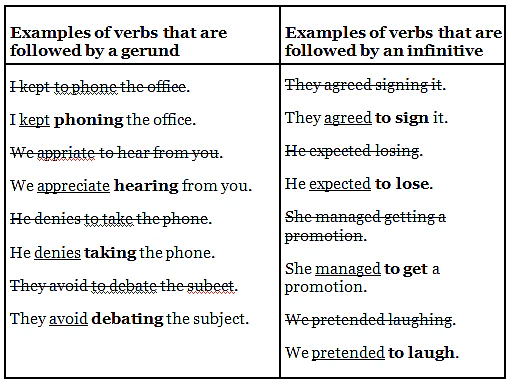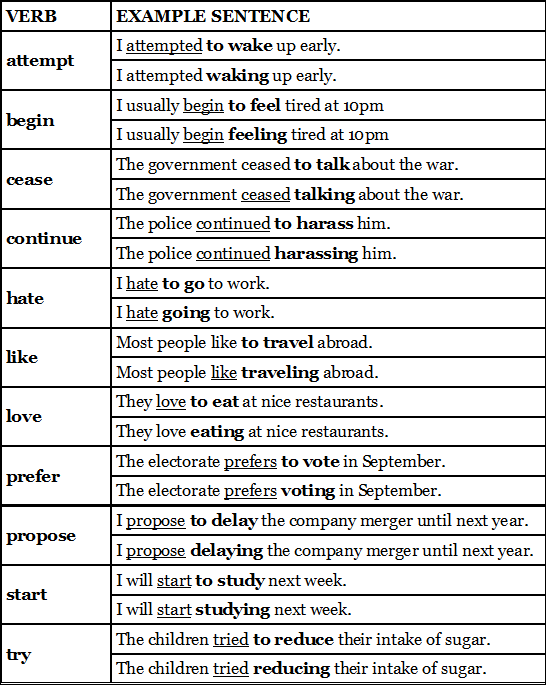IELTS Exam > IELTS Notes > Writing for Academic IELTS > Notes: Gerund & Infinitive
Notes: Gerund & Infinitive | Writing for Academic IELTS PDF Download
Choosing between the gerund and infinitive when they are the object of the sentence can cause a lot of difficulties for students of English.
If they are the object of the sentence, that means they come after the verb. Make sure you look at the previous lessons on gerunds and infinitives to see which one to use after which verb.
As you will remember from those lessons, some verbs can only be followed by the gerund (not the infinitive) and some verbs can only be followed by the infinitive (not the gerund).
Here are some examples but go to the gerund and infinitive lessons for more examples:

Verbs followed by either infinitives or gerunds
However, in some cases you can use either the gerund or the infinitive. Here are some common verbs that can be followed by either:

The document Notes: Gerund & Infinitive | Writing for Academic IELTS is a part of the IELTS Course Writing for Academic IELTS.
All you need of IELTS at this link: IELTS
|
30 videos|206 docs|17 tests
|
FAQs on Notes: Gerund & Infinitive - Writing for Academic IELTS
| 1. What is the difference between gerunds and infinitives? |  |
Ans. Gerunds and infinitives are both verb forms, but they have different functions in a sentence. A gerund is a verb form that functions as a noun, while an infinitive is a verb form that is typically preceded by the word "to" and can function as a noun, adjective, or adverb.
| 2. How do I know when to use a gerund or an infinitive? |  |
Ans. The choice between using a gerund or an infinitive depends on the verb that precedes it and the context of the sentence. Some verbs are followed by a gerund, while others are followed by an infinitive. There are also certain verbs that can be followed by either a gerund or an infinitive, but with a change in meaning.
| 3. Can you provide examples of verbs that are followed by gerunds? |  |
Ans. Sure! Some common verbs that are followed by gerunds include: enjoy (I enjoy swimming), dislike (She dislikes cooking), recommend (He recommends studying), and avoid (They avoid eating fast food).
| 4. What are some verbs that are followed by infinitives? |  |
Ans. Some verbs that are typically followed by infinitives include: want (I want to go), need (She needs to study), decide (He decided to quit), and forget (They forgot to bring their passports).
| 5. Are there any verbs that can be followed by either a gerund or an infinitive? |  |
Ans. Yes, there are some verbs that can be followed by either a gerund or an infinitive, but with a change in meaning. For example, "remember" followed by a gerund means to recall a past action (I remember swimming in the lake), while "remember" followed by an infinitive means to not forget to do something in the future (Please remember to lock the door). Other verbs in this category include: stop, start, and like.
Related Searches
















